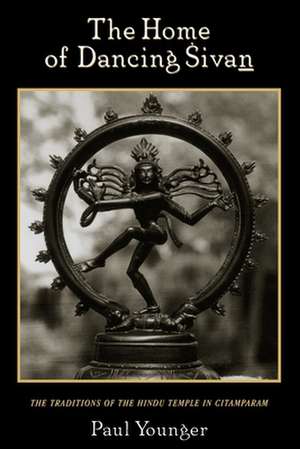The Home of Dancing Sivan: The Traditions of the Hindu Temple in Citamparam
Autor Paul Youngeren Limba Engleză Paperback – 21 feb 1996
two hundred priests of the temple who carry on an ancient tradition involving six worship periods each day, and discusses in detail the elaborate temple festivals, which attract up to 200,000 people. He analyzes the three hundred inscriptions on the temple walls, and seeks to determine from them,
and from the evidence of art history, when the many components of the temple were constructed and what innovations in the worship tradition they made possible. Using the inscriptions and the abundant literature about the temple, he also addresses the complex historical questions regarding roles
played by famous kings and saints of the region in the life of the temple.
The traditions of the Citamparam temple reflect the worship style of all important Hindu temples, and its history is central to all history, literature, and thought of South India. This unique study acknowledges the centrality of the temple in Indian life and society, and provides a vivid and
engaging portrait of South India's living religion for students of religious studies, Asian studies, and Indian civilization.
Preț: 624.54 lei
Preț vechi: 811.09 lei
-23% Nou
Puncte Express: 937
Preț estimativ în valută:
119.50€ • 124.77$ • 98.91£
119.50€ • 124.77$ • 98.91£
Carte tipărită la comandă
Livrare economică 05-19 aprilie
Preluare comenzi: 021 569.72.76
Specificații
ISBN-13: 9780195095333
ISBN-10: 0195095332
Pagini: 272
Ilustrații: halftones, line drawings, map
Dimensiuni: 155 x 235 x 18 mm
Greutate: 0.39 kg
Editura: Oxford University Press
Colecția OUP USA
Locul publicării:New York, United States
ISBN-10: 0195095332
Pagini: 272
Ilustrații: halftones, line drawings, map
Dimensiuni: 155 x 235 x 18 mm
Greutate: 0.39 kg
Editura: Oxford University Press
Colecția OUP USA
Locul publicării:New York, United States
Descriere
Younger describes the daily and festival worship of the only Hindu temple in India where Shiva in his dancing form is the primary object of worship. He analyses the history revealed in the architecture of the buildings and the 300 inscriptions on the temple walls, and in the process tries to understand the multifaceted role of the temple in Indian life. His study paints a vivid portrait of the living religion of South India.
Recenzii
a text of exemplary and sympathetic scholarship ... No visitor to the temples of South India should be without it.
